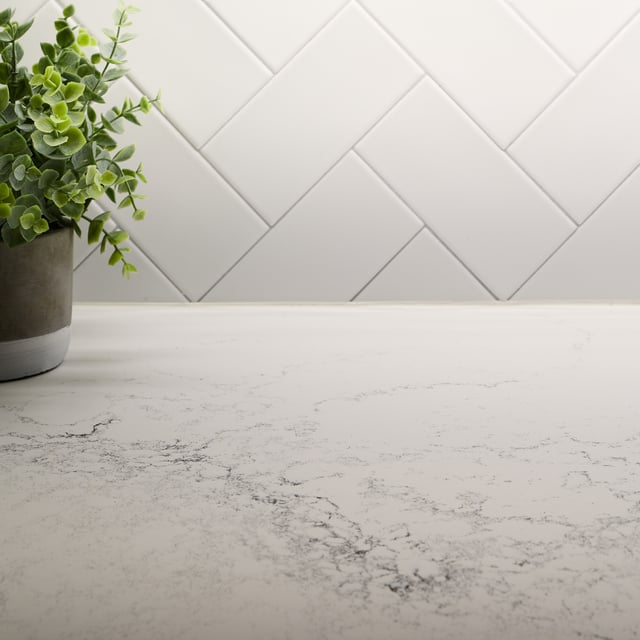.png?width=640&name=u5821215421_ndustrial_loft_kitchen_with_exposed_steel_beams_m_2ee82435-dc1f-4c66-b21b-878cad8b5359_3%20(1).png)
Kitchen
Mixing Metals in the Kitchen
02.02.2026


In This Article
Choosing the perfect countertop for your kitchen remodel is about more than just aesthetics—it’s about finding the right balance between style, durability, and budget. Your countertops will be one of the most hardworking surfaces in your home, standing up to everything from meal prep and family dinners to entertaining guests. Whether you're dreaming of a sleek, modern kitchen with clean lines or a cozy, rustic space filled with warmth, the right countertop can anchor the design while providing the functionality you need.
With options ranging from the timeless beauty of granite to the sleek, industrial edge of stainless steel or the budget-friendly practicality of laminate, there's a material out there for every kitchen style and need. We'll explore the most popular countertop materials, highlighting their pros and cons and offering some practical tips to help you choose the perfect surface for your lifestyle and cooking habits.
So, as you dive into your kitchen remodel, keep in mind that your countertops do more than just look good—they need to handle the heat, the spills, and the everyday wear and tear of a busy household.
Granite is often considered the gold standard for kitchen countertops due to its durability and natural beauty. Each granite slab is a work of art, formed over millions of years with unique patterns and colors. Whether you prefer a polished or honed finish, granite has a look that can elevate almost any kitchen. Popular colors include rich browns, deep blues, or creamy whites with subtle veining. It's no wonder granite is still a favorite among homeowners, especially those looking to create a luxurious kitchen space.
But it’s not all about looks. Granite is heat-resistant, so placing hot pots or pans directly on the surface won't cause damage—a key feature for avid cooks. Additionally, it’s scratch-resistant, making it a great choice for those who plan to use their kitchen for heavy-duty cooking.
However, granite’s porous nature means it can absorb liquids, oils, and other stains if not properly sealed.
Resealing every one to three years is necessary to prevent this. If you're considering granite, be prepared for some upkeep to maintain its beauty over time. Also, granite is heavy, and you may need reinforced cabinetry to support it.
Design tip: Granite works well in both traditional and modern kitchens. Pair dark granite with white or light-colored cabinets for a dramatic, high-contrast look.
Quartz countertops are rapidly growing in popularity thanks to their blend of durability and low maintenance. Unlike natural stone, quartz is engineered from a mixture of crushed quartz and resin, resulting in a non-porous surface. This means it’s naturally resistant to stains, scratches, and bacteria, making it one of the easiest countertops to maintain.
Another advantage of quartz is the variety of styles available. Since it’s manufactured, quartz can be made to mimic the appearance of natural stones like marble or granite, giving homeowners a wide range of design options. Some quartz styles even include patterns that resemble concrete or limestone, offering a modern, industrial look.
One downside is that quartz is not as heat-resistant as granite. You’ll need to use trivets or hot pads to protect the surface from heat damage. It’s also on the pricier side, so while it’s a great investment, it may not be ideal for budget-conscious remodels.
Design tip: Quartz is perfect for minimalist or contemporary kitchens. For a streamlined, modern aesthetic, opt for a sleek, solid-colored quartz countertop.

Caesarstone, a specific brand of quartz countertops, is synonymous with quality and innovation. As one of the leaders in engineered quartz, Caesarstone offers a variety of premium finishes and textures that make it a standout choice for anyone looking for something both functional and stylish. Known for its scratch resistance, Caesarstone is ideal for households that see a lot of action in the kitchen.
Caesarstone also has an array of contemporary designs, including surfaces that mimic the elegance of marble without the upkeep. You can find Caesarstone in neutral shades like soft grays or dramatic black, offering flexibility for both modern and classic kitchen designs.
While it's similar to other quartz options in terms of durability and low maintenance, Caesarstone comes with a higher price tag compared to other quartz brands. It’s worth considering for those who want something high-end and unique, but it's a luxury investment.
Design tip: Caesarstone pairs beautifully with mixed materials. Try combining it with wood accents or metal hardware for an eclectic, designer feel.

Stainless steel countertops bring an industrial edge to your kitchen. Known for their durability and sleek appearance, they’ve been a favorite in commercial kitchens for years. Now, they’re gaining traction in residential spaces, especially for those who want a professional, minimalist aesthetic. Stainless steel is naturally resistant to heat, stains, and bacteria, making it one of the most hygienic countertop options available.
The biggest advantage of stainless steel is its durability. It can withstand high temperatures, heavy use, and frequent cleaning, making it a great choice for chefs or busy families who cook often. However, stainless steel does have some downsides. It can easily show fingerprints, smudges, and scratches, so if you’re a perfectionist, you may find yourself constantly wiping it down. It’s also prone to dents if heavy items are dropped on it, so some care is needed.
Design tip: Stainless steel looks especially stunning in modern, industrial kitchens. Pair it with bold colors or dark cabinetry for an eye-catching contrast.
Concrete countertops offer a bold, industrial look that can be completely customized to your liking. They are poured into molds, allowing you to create virtually any shape or size. You can even embed materials like glass or stones into the surface to create a unique, personalized look. Concrete can also be stained or tinted in various colors, providing a wide range of design possibilities.
Concrete countertops are heat-resistant and durable, making them ideal for avid cooks. However, like granite, concrete is porous and requires sealing to prevent staining. Without proper sealing, it can absorb liquids and develop cracks over time. The weight of concrete countertops is another consideration—they’re extremely heavy, so make sure your cabinets are up to the task.
Design tip: For a modern, minimalist look, pair concrete countertops with matte black cabinetry or raw wood finishes.
If you’re going for a luxurious, timeless look, marble countertops are hard to beat. Marble's natural veining and elegance can transform any kitchen into a work of art. It’s particularly popular in high-end homes and is often used in more decorative areas like kitchen islands.
While marble is heat-resistant and great for baking, it’s also one of the most delicate countertop materials. It's prone to scratching, etching, and staining—especially from acidic substances like wine, lemon juice, or tomatoes. To maintain its beauty, marble requires regular sealing and more cautious use than other materials. It’s best suited for kitchens where aesthetics are a priority and heavy cooking isn't as frequent.
Design tip: Marble works best in classic or transitional kitchens. Pair it with brass or gold fixtures for a timeless, upscale vibe.
Butcher’s block countertops are a charming choice for a warm, natural look. Made from thick slabs of wood, typically maple, oak, or walnut, they bring warmth and a rustic touch to your kitchen. One of the unique benefits of butcher's block is that you can use it as a cutting surface—perfect for the avid cook who loves food prep right on the counter.
However, wood is a living material that expands and contracts with humidity, so it requires regular oiling and maintenance to prevent cracking and water damage. It's also more susceptible to scratches and dents than harder surfaces like granite or quartz, but many people find the worn look of butcher’s block to be part of its charm.
Design tip: Butcher's block looks beautiful in farmhouse-style kitchens or mixed with more modern materials like quartz or concrete for an eclectic design.

Tile countertops offer endless possibilities for customization. You can choose from a wide variety of colors, shapes, and materials, allowing for creativity in your kitchen design. The tile is resistant to heat, stains, and water, making it a durable choice for everyday kitchen use.
The downside? The grout between tiles can stain easily and be a hassle to clean. It’s also not as smooth as other countertop materials, which can be a challenge when rolling out dough or working on food prep. Additionally, tiles can crack under heavy impact, so it’s not the most practical option for a busy kitchen.
Design tip: Tile works well in vintage or Mediterranean-style kitchens. Choose colorful, patterned tiles for a fun, eclectic look.
Best for: Vintage or Mediterranean-style kitchens, budget-conscious remodels

Written by Jordi Lippe-McGraw
Jordi Lippe-McGraw
What countertop is most durable?
What is the easiest countertop to maintain?
What is the most scratch-resistant kitchen countertop?
What is the most stain-resistant kitchen countertop?
What are the most affordable countertop materials?
Do kitchen countertops need to be level?
What are the countertop trends for 2024?
Should countertops be lighter or darker than my cabinets?

Renovate confidently with Block
Easily compare quotes from top quality contractors, and get peace of mind with warranty & price protections.
Thousands of homeowners have renovated with Block

4.5 Stars (100+)

4.7 Stars (100+)

4.5 Stars (75+)
.png?width=640&name=u5821215421_ndustrial_loft_kitchen_with_exposed_steel_beams_m_2ee82435-dc1f-4c66-b21b-878cad8b5359_3%20(1).png)
Kitchen
Mixing Metals in the Kitchen
02.02.2026
.jpg?width=640&name=c4dbb180-5d7c-45ed-a7e4-5851358dee67%20(3).jpg)
Kitchen
Remodeling Kitchens Without Windows - Design Ideas
01.17.2026

Kitchen
Kitchen remodel Denver: costs, permits, and tips
01.13.2026

Kitchen
Ideas for Transitional Kitchen Design
12.23.2025

Kitchen
Modern Rustic Kitchen Designs & Remodels
12.18.2025
Renovate confidently